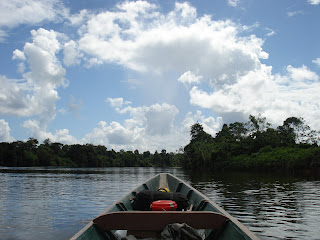Today my new friend Zoozlen took me to the river to teach me how to “hooko” (fish). She had her 5 children, a big bucket of dirty dishes, a fishing pole and some cassava in tow. There are two places on the bank of the river in our village that women go 2-3 times a day to wash clothes, dishes, their children, and themselves. Many people have durotanks that catch rainwater, but that water is reserved mostly for drinking. Also, our village has community sinks throughout, but I have only seen a few women use these (mostly the older women...and me!). They do not work all the time, so, out of habit, the women go where they know the water will always work- the river.
When we arrive at the river, Zoozlen walks down the cement stairs that end in the river, so I follow, soaking the hem of our koosus. She has the fishing pole that she's made just today, a stick with line and a hook on the end. She attaches a ball of flour mixed with water, throws it out into the river and hands me the stick. I caught one big fish pretty quickly. I have no idea what kind in English, but in Saramaccan it is called waku. By the end of our adventure, we caught about 7 fish: 2 big ones and 5 small ones. I thought I was being pretty tough by being able to unhook the fish and carry them back to our bucket with my bare hands. Then I watched as Zoozlen's 9-year-old daughter starts to scale and gut one of the fish and I have to turn away as I notice the fish is still gasping for oxygen as she rips out his entrails. For about the fiftieth time since I have been here, I marvel at how different the world I grew up in is from the reality these kids grow up in.
We are at the water's edge for about 2 hours and during that time numerous other women come with their dirty dishes and clothes. They all bend in half with no effort and grate their clothes against a flat stone while rubbing with soap. There are kids running around everywhere. The older ones are trying their hand at fishing as well. I observe everything and by the time we leave, I have seen women wash clothes, wash dishes, wash their children, wash themselves, fish, gut fish, clean and cut chicken, throw away garbage, clean fresh cassava and pee in the same 11 foot bank of the river. This is their way of life here. The Suriname River runs through some of the most pristine rainforest in the world. It is also the main water source and only mode of transportation for the thousands of Saramaacan people that have lived along it's banks for hundreds of years. It is amazing to me how these people have carved out a life for themselves deep in the jungle and how that life is evolving as influences from “the west” are coming face to face with their traditional way of life.



way to go! its amazing that a world like mine and world like yours can be under the same sun at the same time... amazing.
ReplyDelete